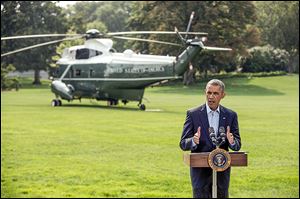
Airstrikes in Iraq could last months
Obama hints at extended military role
8/10/2014
President Obama speaks to the media on the South Lawn of the White House on Saturday.
WASHINGTON — President Obama said on Saturday that airstrikes and humanitarian assistance drops in Iraq could go on for months, preparing Americans for an extended military presence in Iraq as leaders there try to build a government.
“I don’t think we’re going to solve this problem in weeks,” Mr. Obama said before leaving for a two-week vacation on Martha’s Vineyard. “This is going to be a long-term project.”
The President again insisted that he will not send ground troops back to Iraq after ending a decade-long war and withdrawing the last troops in 2011.
But two days after emphasizing the limited scope of the mission, he pledged the United States will stand with Iraq if it can form a unified and inclusive government to counter the Sunni militants who threaten the nation.
The President assessed the air campaign’s duration as militants with the Islamic State in Iraq and Syria began advancing up Mount Sinjar in northern Iraq, where thousands of Yazidis, an ethnic and religious minority, remain trapped.
In Mosul, residents reported that nearly two dozen bodies of ISIS militants, said to have been killed in American airstrikes, had arrived at the city’s morgue and at least 30 wounded fighters were being treated at a hospital.
U.S. military officials said late Saturday that American jet fighters and drones conducted four more airstrikes on the militants, taking out armored carriers and a truck that were firing on civilians.
U.S. Central Command said the militants were firing on Yazidi civilians taking shelter in the Sinjar mountains.
Saturday was the first time Mr. Obama had addressed the question of a timeline for the military intervention in Iraq. His remarks are likely to raise new questions, especially among those who fear that the mission could pull America back into a more robust involvement in the country. The President said he would not give a “particular timetable” on the new operations.
Aides said that Mr. Obama had not committed to years of continuous airstrikes while Iraqis develop a new government, but that his comments reflected the uncertainty of a military effort that will be re-evaluated in the months ahead.
When he announced the airstrikes on Thursday night, Mr. Obama emphasized the immediate goals of protecting Americans in Baghdad and in Irbil, the capital of the Kurdish autonomous region in northern Iraq, and helping to rescue the Iraqis trapped by Islamic State fighters on the mountain.
In his remarks Saturday morning, he focused more on the need to help Iraqis over the long term, giving them what he called space to develop a government that can fight back against the militants.
His acknowledgment that the effort in Iraq will take time may not be enough to satisfy Republican critics. Many accuse Mr. Obama of failing to embrace a sufficiently aggressive air mission to drive the militants out of Iraq and Syria.
Sen. John McCain (R., Ariz.), Mr. Obama’s 2008 presidential opponent, said Saturday that Mr. Obama’s vision for military operations against militants in Iraq was too narrow.
He said the actions ordered by the President were not nearly enough to counter a growing threat from “the richest, most powerful terrorist organization in history.”
In describing a potentially long time frame for military action in Iraq, Mr. Obama cited in part the danger and complexity of the rescue mission on Mount Sinjar.
The military has airdropped 36,224 meals to the refugees in the last two days, officials said. But the President said the much harder task of creating a safe corridor for them down the mountain would take more time.
Defense Department officials expressed confidence that they could achieve within a few days one of the announced goals: stopping the advance of the militants on Irbil, where hundreds of U.S. diplomatic officials and military advisers are stationed.
On Friday, the military struck a number of ISIS targets near Irbil, including a stationary convoy of seven vehicles and a mobile artillery unit that was being towed by a truck.
“We can stop them from moving into Irbil,” a senior Defense Department official said Saturday. “The cost will become too high. There will be a tremendous amount of deterrence in these strikes.”